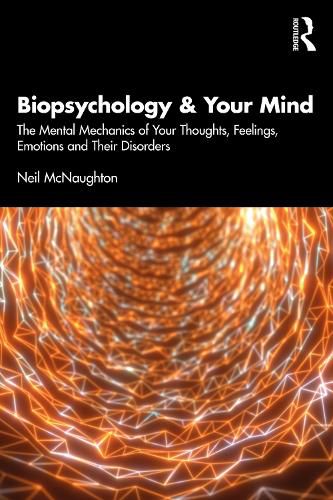Readings Newsletter
Become a Readings Member to make your shopping experience even easier.
Sign in or sign up for free!
You’re not far away from qualifying for FREE standard shipping within Australia
You’ve qualified for FREE standard shipping within Australia
The cart is loading…






Biopsychology & Your Mind explains the way your mind works - and why it sometimes doesn't. The key is your mental mechanics: molecular, neural, and biological mechanisms.
This book explores the unexpected properties of thoughts, feelings, emotions, and actions, examining phenomena such as blindsight, associative learning, intact memory in amnesia, and dreaming during sleep. Using evolutionary biopsychology as a framework, it addresses fundamental questions: What constitutes an emotion? How do thoughts and emotions interact? The text reveals how evolution has shaped our mental mechanics to seek adaptive balances, often switching between extremes depending on current circumstances. Mental disorders are presented as otherwise adaptive reactions that are occurring either in unusually extreme situations or within systems that are unusually reactive. The book demonstrates how evolutionary pressures have created mental systems that rapidly change between states, seeking optimal responses rather than fixed solutions.
This book is a must-read for anyone seeking to understand mental machinery and psychological disorders. Detailed notes, references, and technical sections also make it an ideal companion for all students of biopsychology.
$9.00 standard shipping within Australia
FREE standard shipping within Australia for orders over $100.00
Express & International shipping calculated at checkout
Biopsychology & Your Mind explains the way your mind works - and why it sometimes doesn't. The key is your mental mechanics: molecular, neural, and biological mechanisms.
This book explores the unexpected properties of thoughts, feelings, emotions, and actions, examining phenomena such as blindsight, associative learning, intact memory in amnesia, and dreaming during sleep. Using evolutionary biopsychology as a framework, it addresses fundamental questions: What constitutes an emotion? How do thoughts and emotions interact? The text reveals how evolution has shaped our mental mechanics to seek adaptive balances, often switching between extremes depending on current circumstances. Mental disorders are presented as otherwise adaptive reactions that are occurring either in unusually extreme situations or within systems that are unusually reactive. The book demonstrates how evolutionary pressures have created mental systems that rapidly change between states, seeking optimal responses rather than fixed solutions.
This book is a must-read for anyone seeking to understand mental machinery and psychological disorders. Detailed notes, references, and technical sections also make it an ideal companion for all students of biopsychology.